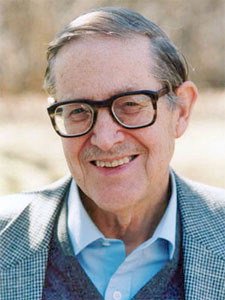In memoriam: James Serrin

Professor Emeritus James Serrin of Minneapolis, a long-time professor in the University of Minnesota’s School of Mathematics from 1954 to 1995, passed away on Aug. 23, 2012. He was 85. Serrin was known throughout the world for his fundamental research on the properties of basic mathematical models for the flow of gases and liquids, and for the mechanical and thermodynamical behavior of materials.
Born Nov. 1, 1926 in Chicago, Ill., Serrin received his bachelor of arts degree from Western Michigan College in 1947.
After receiving his Ph.D. in mathematics from Indiana University in 1951, Serrin was appointed the Fine Instructor of Mathematics at Princeton University. From Princeton, he moved to the Massachusetts Institute of Technology where he was a CLE Moore Instructor of Mathematics from 1952-54. He came to the University of Minnesota in 1954 as an assistant professor of mathematics and became a full professor in 1959.
At the University of Minnesota, Serrin served as Head of the School of Mathematics from 1964-65, and was named Regents Professor of Mathematics in 1969. He was president of the Society for Natural Philosophy from 1969-70, and served on the Council of the American Mathematical Society from 1972-74. In 1973, he was awarded the G. D. Birkhoff Prize in Applied Mathematics from the American Mathematical Society.
In 1979, he received the Distinguished Alumni Award from Indiana University, and the following year, he was elected a fellow of the American Association for the Advancement of Science and a member of the National Academy of Sciences.
Serrin was elected a member of the American Academy of Arts and Sciences in 1984, and received honorary doctorates from four European universities including the University of Ferrara, the University of Essex, and the University of Padova. He retired in 1995, and was named professor emeritus by the University of Minnesota. That same year, he was elected to the Finnish Academy of Sciences.
Over the years, Serrin published numerous professional journal articles, sponsored research reports, textbooks, monographs, and instructional materials. He gave presentations at professional conferences, participated in worldwide invited talks, served on numerous editorial boards and committees, and held many visiting professorships throughout the world. These activities continued until the very end of his life.
